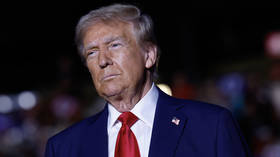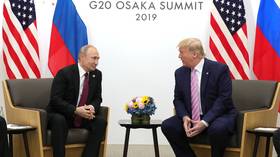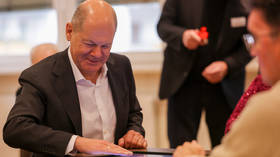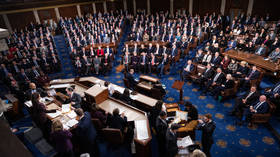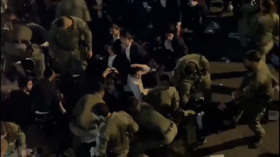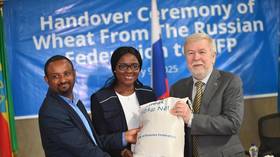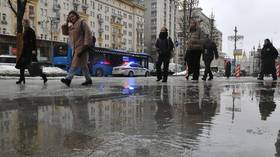Double dirty deed: Anti-Russia smear campaign also targets Trump
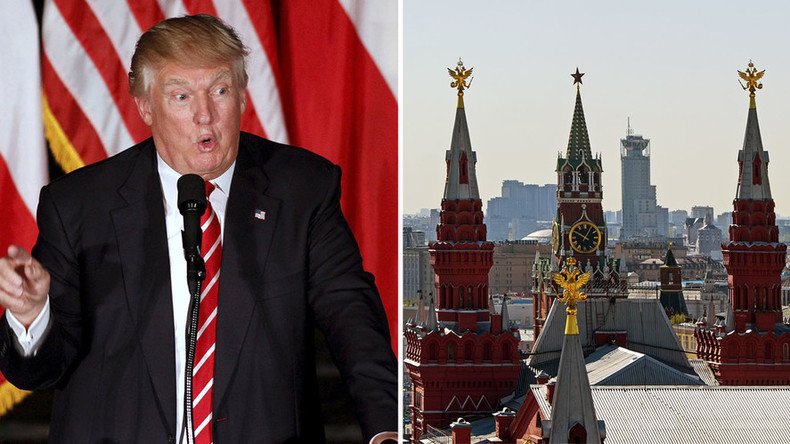
Sensational reports of Russian government spies hacking into the Democrat party’s computers weren’t the usual anti-Moscow smear job. Republican presidential contender Donald Trump also took a hit in the double whammy.
The abrasive business tycoon may have a popular following among grass roots voters, but he has managed to garner powerful enemies within the American establishment. Not least large sections of the corporate news media, the military and foreign policy arms of US government.
Government-owned news outlet Voice of America reports this week that Republican leaders are “wringing their hands” over Trump and seeking to nix his presidential nomination. This impetus against the billionaire politician has grown in the wake of last week’s mass shooting in Orlando, Florida, when Trump “doubled down” on controversial anti-Muslim rhetoric, which is seen as divisive and alienating voters.
Trump’s enemies in the media are topped by the Washington Post after he banned the newspaper from covering his campaign. In an unprecedented move, he revoked official accreditation to the paper’s reporters after he slammed the Post for “phony and dishonest” coverage. The paper has prominently featured columns that purport to “debunk” many of Trump’s political claims and statements.
Trump made another powerful enemy when he scoffed at the US-led military umbrella NATO, deriding the 28-member military bloc as an “obsolete” organization. He also said he would slash US financial and military commitments if elected president. Trump stepped on serious toes there since NATO can be seen as a lynchpin of American imperial power projection and a crucial financial pump for the Pentagon and its military-industrial complex.
Earlier this month, CNN ran an “exclusive” op piece to NATO. Headlined “Inside NATO as it faces fire from Trump”, the organization was given ample space to justify its existence as “cutting edge” and “transforming” for its stated purpose of maintaining global security. Trump’s name wasn’t mentioned explicitly by NATO officials, but it was obvious that he had rankled the alliance, and it was out to burnish its image, which CNN generously indulged.
Now let’s deal with the smear job at issue. On Tuesday, the Washington Post splashed with this story: “Russian government hackers penetrated DNC, stole opposition research on Trump”.
The Post’s “national security” reporter Ellen Nakashima writes: “Russian government hackers penetrated the computer network of the Democratic National Committee and gained access to the entire database of opposition research on GOP presidential candidate Donald Trump, according to committee officials and security experts who responded to the breach.”
The first thing to note is the poor journalistic standard, whereby the headline of a news report is presented as a fact – “Russian government hackers penetrated DNC” – when the information is actually only a claim “according to committee officials and security experts”, as the first paragraph discloses.
in 16 hours we've gone from "it was absolutely Russia" to "who did it?" pic.twitter.com/bzY2Zbf6mV
— Adam H. Johnson (@adamjohnsonNYC) June 16, 2016
And on reading the article it turns out that the claim made against the Russian government is underwhelming. The entire article is based on the hearsay of the private security firm employed by the Democrat party. There is no evidence presented to substantiate the assertion that the alleged hackers were linked to Russian military intelligence (GRU) or its state security service (FSB).
This is true to form for that Washington Post reporter. Last year, Nakashima published several articles in which she similarly claimed that Russia and Chinese government hackers had broken into the White House network and other federal databases. Again, those articles were based on unverified claims by anonymous officials and private security firms.
For the record, the Russian government flatly denied having anything to do with the latest computer hack at the DNC. “I completely rule out a possibility that the [Russian] government or the government bodies have been involved in this,” said Dmitry Peskov, the Kremlin’s spokesman.
A second telling aspect about the story was that on the same day that the Washington Post led on it, all the major US media, and some prominent British ones too, also ran with it. All with nearly the same wording of the factually sounding headline imputing the Russian government. That kind of wall-to-wall, uniform coverage is indicative that the story was primed by a governmental agency for media broadcast. In short, a disinformation campaign.
The obvious target here is Russia. Not for the first time has the Kremlin been accused with breaching US computer networks and generally being a sinister specter threatening national security – as if Washington is not also carrying out the same espionage and worse. The hacker story is but just one more twist in Washington’s overarching anti-Russia narrative, including accusations that it is destabilizing European states, annexed Crimea, is invading Ukraine, and bombing hospitals and civilians in Syria.
This just became a big deal. https://t.co/SQSQuTqyxT
— Edward Snowden (@Snowden) June 16, 2016
Russian spies allegedly interfering in American domestic politics and a presidential election by hacking into the Democrat National Committee is aimed at whipping up Cold War public resentment towards Moscow.
But perhaps the bigger target of the disinformation is Donald J Trump.
Notice how the alleged Russian hack was coupled prominently with “stealing opposition research on Trump”. And, pointedly, all the media headlines also featured this aspect. Patently, the Trump detail was intended as a “talking point”, as they say in state intelligence parlance.
The Trump campaign reportedly brushed off the “news” that personal information had been accessed by hackers. His campaign team breezily referred reporters to contact federal investigators.
However, here’s the thing. By making it appear that the Russians have the goods, or the dirt, on Trump the intended effect is that he would be viewed as “compromised” in the eyes of American voters. He would be, according to this logic, a national security risk if elected president, vulnerable to being manipulated, blackmailed or some other form of coercion – by America’s number one global enemy, Russia.
The Washington Post is not the only one with a confluence of interest in running the Russian hacker/Trump damaged story. The private security firm, CrowdStrike, that the DNC contracted to purportedly hunt for the Russian spyware is linked to NATO and the US foreign policy establishment. And it is CrowdStrike’s assessment upon which the entire story in the Washington Post and all the other media outlets is based.
Dmitri Alperovitz, CrowdStrike’s chief technology officer, is quoted frequently as the main source of the story, and as saying they have “high confidence” it was Russian hackers, “but we don’t have hard evidence”.
In what seems a clumsy disclosure, the Washington Post article makes a passing reference to Alperovitz being “a senior fellow at the Atlantic Council”.
The Atlantic Council, based in Washington DC, is a high-profile international think tank that publishes papers, holds seminars and hosts leading American and European public figures to present a solidly “Atlanticist” US foreign policy. The Atlantic Council is tightly aligned with the US-led NATO military alliance and is regularly briefed by NATO leaders, including former commander General Philip Breedlove and current secretary general Jens Stoltenberg. It is an avid cheer leader for the anti-Russian narrative that dominates US policy towards Moscow.
In sum, the latest media smear job on Russia was a double dirty trick. With Donald Trump also on the receiving end.
The statements, views and opinions expressed in this column are solely those of the author and do not necessarily represent those of RT.




